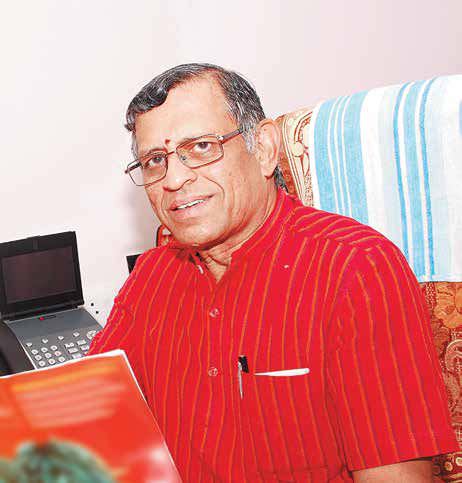Prøve GULL - Gratis
Businessworld
|August 8, 2016
In an exclusive conversation with BWBusinessworld’s Suman K. Jha, Swadeshi ideologue S. Gurumurthy talks about the Patanjali business phenomenon. Referring to the battle between desi versus foreign-grown companies, he says cultural appeal is a necessary part of the innovation of companies like Dabur, Tata, apart from Ramdev’s Patanjali. Excerpts:
-

Is it an unequal battle — desi companies vs foreign multinational companies, with deep pockets?
Yes it is. In more than one sense. First, we are a debt-dominated economy, where current cost of capital has to be met, whereas the MNCs are driven by equity and they can postpone returns to the investors. Second, there is so much of phoney money unrepresented by production — over $700 trillions against power money of just $7 trillions that too much of hot money is seeking instant investment opportunities. Indian capital, or banks cannot compete with that kind of cheap money. So the MNCs are generally able to out-fund, undersell, outsell and buyout desi companies. This was proved in the case of consumer durables and automobile, where Indian companies lost out huge space to MNCs.
A number of homegrown desi companies are posing a stiff challenge to foreign brands. Ola is taking on Uber; Micromax is holding on to its base in the face of an aggressive Samsung charge; and of course, we all know about the successful Patanjali forward march. Can this become the norm? Can our desi companies, through innovation, and by invoking national pride, beat the foreign competition?
I will answer it in two parts. First of all in a business like local transport, I prefer neither an global or local major. This is a business, which can be efficiently done by small operators by forming a cooperative digital networking App. The Ola and Uber model converts present and potential entrepreneurs into employees. Therefore, I do not prefer either Uber or Ola.
It is true that some desi companies are doing well, but only in select segments. That Micromax has been able to stand up to Samsung in India is a good thing. But the strength of a company domestically is important for it to become face competition outside. Samsung would not have been able to penetrate the Indian market without being strong in Korea.
Denne historien er fra August 8, 2016-utgaven av Businessworld.
Abonner på Magzter GOLD for å få tilgang til tusenvis av kuraterte premiumhistorier og over 9000 magasiner og aviser.
Allerede abonnent? Logg på
FLERE HISTORIER FRA Businessworld

BW Businessworld
A NOVEL THAT GLIDES THROUGH MANY REALMS
Journalist Nikhil Kumar strides into the arena of fiction with aplomb. His novel navigates continents and decades, capturing both the rarified world of architecture and the intimate spaces where relationships fracture
2 mins
December 13, 2025

BW Businessworld
"Huge Capacities Are Required"
DV Kapur on India's energy future, the need to balance coal and renewables, his eponymous foundation, and much more
2 mins
December 13, 2025

BW Businessworld
METAL, MUSIC & MOTORCYCLING
From the new Bullet 650 to the Flying Flea C6 and S6 electric scrambler concept, Motoverse 2025 brought together heritage motorcycles, next-gen EVs, riding culture and a vibrant global community
5 mins
December 13, 2025

BW Businessworld
Redefining Unalloyed Nationalism
In My Idea of Nation First, author UDAY MAHURKAR argues that India's future governance is inseparable from its understanding of the past,\" writes Srinath Sridharan
3 mins
December 13, 2025

BW Businessworld
"We have consistently delivered an annual ROI of approximately 40 per cent"
Dushyant Singh, a food & beverage entrepreneur, has over 15 years of experience in building F&B brands, including On The House, Rustic, and The Lama. BW Businessworld recently caught up with Singh to chat about his latest venture, Coffee Sutra, a favourite among coffee aficionados in Jaipur. Excerpts
4 mins
December 13, 2025

BW Businessworld
"The AI Race Won't Be Decided By Models & Tokens, But By Economics"
PHILIPP HERZIG, Chief Technology Officer at SAP, discusses the changing mandates of tech leadership, the next phase of AI adoption, SAP's rapid progress with Joule and RPT1, and why India is core to SAP's future, in an interaction with BW Businessworld's Rohit Chintapali. Excerpts
4 mins
December 13, 2025

BW Businessworld
“The genie is not going back in the bottle”
Al will reshape commerce faster than any previous industrial shift, and businesses must now design for scale, trust and permanence rather than novelty, says DIARMUID GILL, Chief Technology Officer, Criteo, in this conversation with Noor Fathima Warsia
2 mins
December 13, 2025

BW Businessworld
PREMIUM PUSH
With Aston Martin watches and 200 new exclusive stores, Timex India sharpens its premium ambitions and long-term growth play
4 mins
December 13, 2025

BW Businessworld
Carrot & Stick Game
Unlisted shares are typically valued based on demand–supply dynamics, rather than on core fundamentals, as detailed financial information is usually limited
3 mins
December 13, 2025

BW Businessworld
STEADY ASCENT
In a fiercely competitive market, can home appliances and durable company Kenstar's calibrated expansion across categories and towns unlock its Rs 3,000-crore revenue ambition?
6 mins
December 13, 2025
Translate
Change font size
